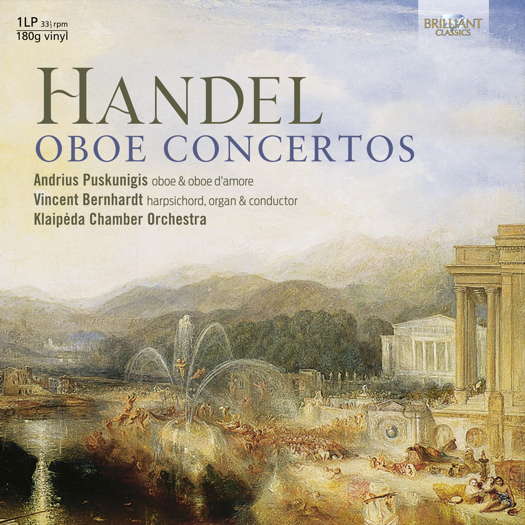ARTICLES BEING VIEWED NOW:
- Régine Crespin
- Hector Berlioz
- Ruth Railton
- Marián Varga
- Profile. A Very Positive Conductor - Paul Bodine talks to Los Angeles Opera's Music Director Designate, Domingo Hindoyan
 ASK ALICE: Weekly, from 2003 until 2016/17, Alice McVeigh took on the role of classical music's agony aunt to answer questions on a surprising variety of subjects.
ASK ALICE: Weekly, from 2003 until 2016/17, Alice McVeigh took on the role of classical music's agony aunt to answer questions on a surprising variety of subjects.
 DISCUSSION: John Dante Prevedini leads a discussion about Music and the Visual World, including contributions from Celia Craig, Halida Dinova and Yekaterina Lebedeva.
DISCUSSION: John Dante Prevedini leads a discussion about Music and the Visual World, including contributions from Celia Craig, Halida Dinova and Yekaterina Lebedeva.

Most Satisfying
GEOFF PEARCE highly recommends Andrius Puskunigis' recording of Handel oboe concertos
'This disc is one of the finest I have heard of an oboist playing Baroque music on a modern instrument.'
This recording was eagerly anticipated. I have reviewed another CD of this oboist's work before, and in it I found some of the tempi somewhat brisk and this detracted from my enjoyment of an otherwise fine disc. I was interested to see whether or not I would come to the same conclusion on this disc. I was only familiar with one work on the disc as an oboe concerto, this being George Frideric Handel's famous G minor HWV 287. There has been much research and many discoveries since I was a student, and more than a few transcriptions.
The First concerto on this disc, Concerto-pasticcio in C for oboe, strings and bc [basso continuo] is one such transcription. It is in four movements. The first, a Largo, is without oboe, but sets up the following movements beautifully. The second movement is a sprightly and well known Handel piece, and the oboist Andrius Puskunigis shines. His tone is bright, which really Handel needs, the speed is not excessive and the movement breathes yet displays ample virtuosity. The third is an arrangement of one of the most beloved of Handel's arias, 'Lascia ch'io pianga' from the opera Rinaldo. The soloist is tender and does not wallow in sentimentality. This is beautifully performed, with special attention being made to the silences between phrases, and some very tasteful ornamentation.
Listen — Handel: Largo (Concerto-pasticcio in C)
(90014 side A track 3, 2:22-2:50) ℗ 2022 Brilliant Classics :
The final movement is a real tour de force, and also based on an aria. It is brisk, with slow interjections which are taken advantage of by the soloist with little cadenzas. This is a joy.
Listen — Handel: Allegro (Concerto-pasticcio in C)
(90014 side A track 4, 0:00-0:57) ℗ 2022 Brilliant Classics :
The second concerto on the recording is a premier recording, and is a three movement work in C minor. This is attributed to Handel (who learned the oboe in his youth, and was very fond of it). The first movement is quite dramatic, and requires considerable virtuosity to perform. This soloist plays it effortlessly. I also like the fact that he does not try to circular breathe where he does not need to, and this assists in creating a more vocal style of oboe playing than is sometimes the case today. He also does not distort some notes, and his sound is even, pure and never bland. The second movement, is somewhat like the Albinoni D minor concerto - I play it in C minor - which is justly so popular. This oboist impresses me so much, as he thinks as a singer would, he does not over embellish and is always conscious of the melodic line.
Listen — attributed to Handel: Adagio (Concerto in C minor)
(90014 side A track 6, 0:00-0:56) ℗ 2022 Brilliant Classics :
The third movement is stormy and demanding on the soloist, requiring some very rapid playing, but the performed speed keeps up the excitement and is tasteful at the same time.
The next concerto is the four-movement well beloved G minor concerto, HWV 267. This is perhaps the finest recording of this work I have ever heard, with a lot of tempi contrasts between movements, finely judged speeds and tasteful ornamentation. I have heard some really dreary recordings of this work, and some far too fast and gabbled ones as well, but this is, in my estimation, perfect.
Listen — Handel: Allegro (Concerto in G minor, HWV 267)
(90014 side B track 2, 0:00-0:38) ℗ 2022 Brilliant Classics :
This is followed by Concerto Grosso Op 3 No 3 in G, HWV 314 for oboe, strings and bc, a four movement work that draws on the Chandos Anthem and Te Deum for much of its material. Again, throughout this work, Andrius Puskunigis impresses me in how he thinks and plays as a singer would, and this produces a stunning musical result. He does not bulge his phrases, nor does he force his sound at all, so it sits very naturally with the strings.
Listen — Handel: Allegro (Concerto Grosso Op 3 No 3)
(90014 side B track 6, 0:00-0:45) ℗ 2022 Brilliant Classics :
The final Concerto, Concerto á 5 in C minor for oboe, strings and bc is also recorded here for the first time, and is not listed in Handel's thematic catalogue. It is fairly brief and in three short movements, the final one being a rather exciting fugato, and a really suitable way to end this most satisfying disc.
Listen — Handel: Allegro (Concerto á 5 in C minor)
(90014 side B track 11, 0:10-0:49) ℗ 2022 Brilliant Classics :
This disc is one of the finest I have heard of an oboist playing Baroque music on a modern instrument. I was very impressed with this recording, both for the standard of the supporting ensemble - the Klaipėda Chamber Orchestra - but for the very fine standard of this oboist as well, and would recommend this disc highly.
Copyright © 3 February 2024
Geoff Pearce,
Sydney, Australia



